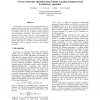107 search results - page 5 / 22 » Clandestine Simulations in Cellular Automata |
JAC
2008
13 years 9 months ago
2008
Abstract. We consider simulations of graph automata. We introduce two local transformations on the neighborhood: splitting and merging. We explain how to use such transformations, ...
LATIN
1995
Springer
13 years 11 months ago
1995
Springer
Partitioning automata (PA) are de ned. They are equivalent to cellular automata (CA). Reversible sub-classes are also equivalent. A simple, reversible and universal partitioning au...
ACRI
2000
Springer
13 years 11 months ago
2000
Springer
This paper describes the first impressions of the development of a multi-agent system that can be used for visualising simulated pedestrian activity and behaviour to support the a...
HIS
2004
13 years 8 months ago
2004
In this paper, a new fuzzy clustering algorithm that uses cellular learning automata based evolutionary computing (CLA-EC) is proposed. The CLA-EC is a model obtained by combining...
CORR
2010
Springer
13 years 4 months ago
2010
Springer
We define a new transfinite time model of computation, infinite time cellular automata. The model is shown to be as powerful than infinite time Turing machines, both on finite and ...

